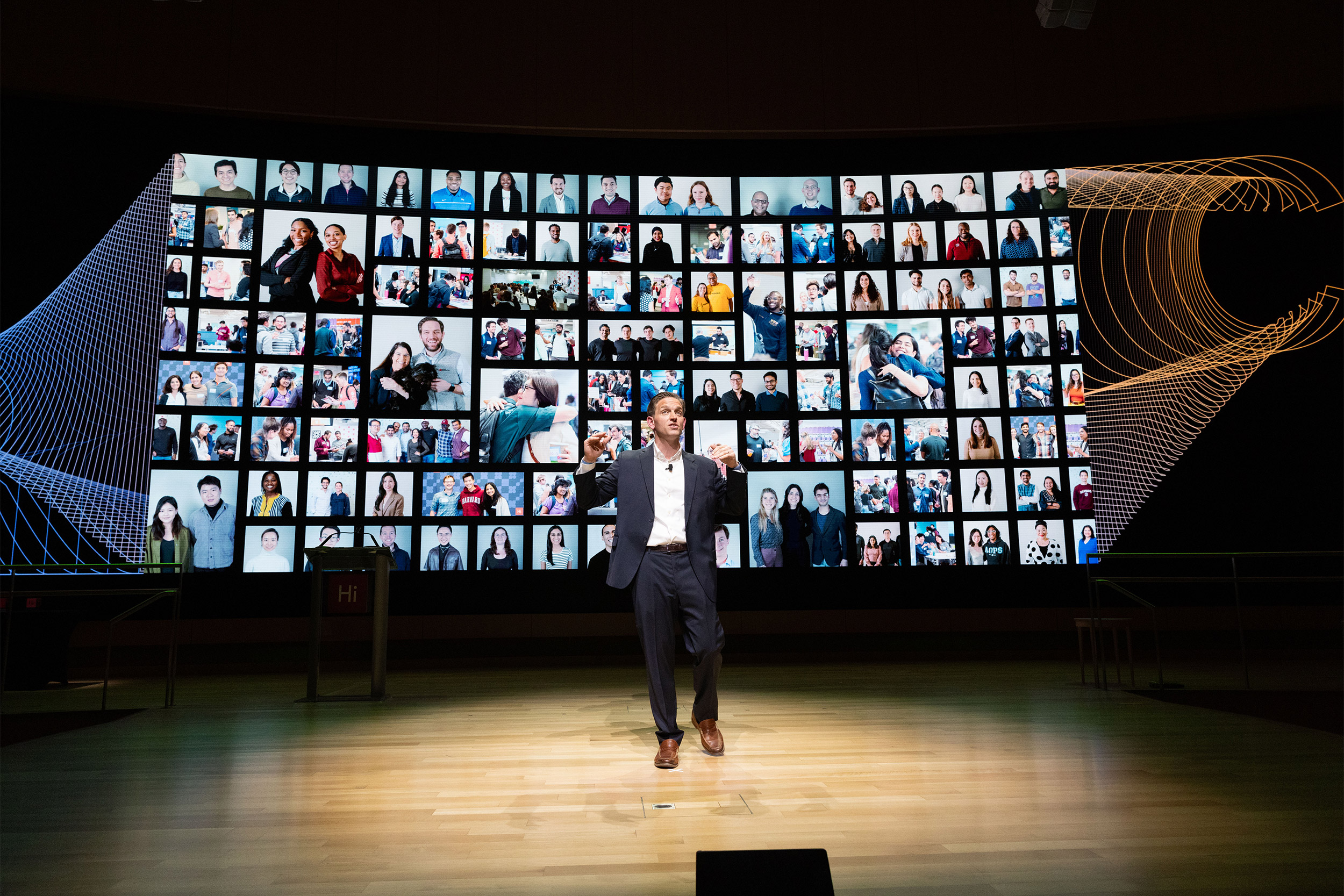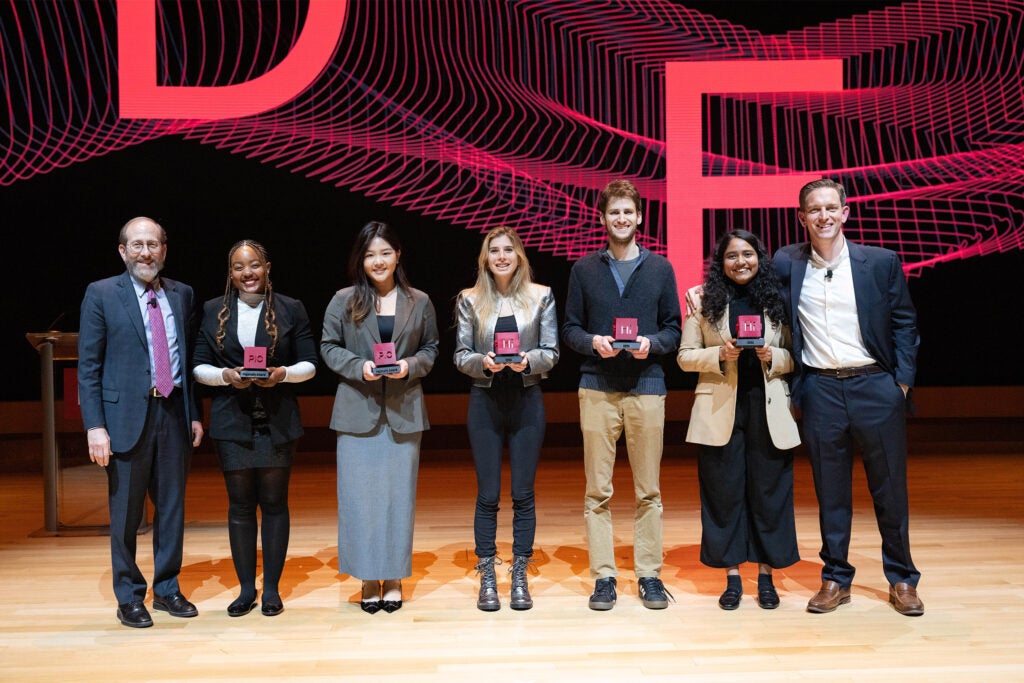Turning ideas into impact

Matt Segneri, the Bruce and Bridgitt Executive Director of the Harvard Innovation Labs, stands in front of a screen filled with members of the i-lab community.
Photos by Eve Photography LLC
Startup founders inspire global audience at 2024 Harvard President’s Innovation Challenge Awards ceremony
Helping trauma surgeons control abdominal bleeding, using AI to maximize farmers’ crop yields, and enabling more African small businesses to participate in global trade. These were three of the winning startup initiatives recognized during the Harvard President’s Innovation Challenge Awards Ceremony.
“Looking at the applications for the President’s Innovation Challenge, I was blown away at the quality,” said Harvard University interim President Alan Garber. “I know it reflects tremendous work by the teams, and tremendous work by all the people supporting them.”
The President’s Innovation Challenge is an annual competition for students and select alumni pursuing ventures that push boundaries in their fields. Thousands of people watched the President’s Innovation Challenge Awards Ceremony on May 1, which drew attendees at Klarman Hall and a virtual audience from around the globe.
During the ceremony, audience members heard from several former President’s Innovation Challenge winners who have achieved significant impact in their fields. SurgiBox, a 2016 challenge winner, shared that its portable operating rooms were used on the battlefield in Ukraine. Chaku Foods, a 2021 winner, has helped farmers across Africa increase their incomes while promoting climate-resilient practices.
Additionally, attendees watched the 2024 finalists showcase a broad range of projects, from using solar power for farm irrigation systems in India to improving early diagnosis of gum disease. Winners received $517,000 in non-dilutive funding, made possible by a gift from the Bertarelli Foundation, co-founded by Ernesto Bertarelli, M.B.A. ’93.
The $75,000 award recipients
Beaver Health (Harvard College): Engaging older loved ones in stimulating, culturally responsive activities to boost cognition and quality of life.
EndoShunt Medical Inc. (Harvard Business School, Harvard John A. Paulson School of Engineering and Applied Sciences): Controlling abdominal bleeding in trauma surgery with an innovative medical device.
MesaQuantum (Harvard Business School, Harvard John A. Paulson School of Engineering and Applied Sciences): Developing chip-scale quantum sensors for next-generation GPS capabilities in position, navigation, and timing.
Solara (Harvard Business School): Providing on-demand solar irrigation to Indian farmers, increasing their access to affordable, reliable, and clean irrigation.
Stratagen Bio (Harvard Business School): Transforming MRI scans into a tool for objective clinical decision-making and quantitative biomarker assessment.
“This money is going to fund our initial pilots for the irrigation we’re doing in eastern India,” said Rea Savla, founder of Solara. “More importantly, the exposure that we’ve already gotten through this process … is going to be transformative in bringing Solara to market and impacting as many farmers as we can. Thank you from the bottom of our hearts.”
The $25,000 award recipients
Bullseye Biosciences (Harvard Kenneth C. Griffin Graduate School of Arts and Sciences): Transforming therapeutics discovery and expediting the development of life-saving medicines.
Crop Diagnostix (Harvard Business School): Building the future of predictive agriculture with patented, AI-powered gene expression technology.
MabLab (Harvard College): Designing five-in-one test strips to detect the five deadliest lacing agents in recreational drugs.
Saturday Art Class (Harvard Graduate School of Education): Unleashing the creative potential of marginalized children in India with visual arts education that promotes the development of social-emotional skills.
TecHustle (Harvard Kenneth C. Griffin Graduate School of Arts and Sciences, Harvard Law School): Creating Africa’s largest small business network for global trade, providing financial services and market access.
Additionally, the President’s Innovation Challenge awards $17,000 in Ingenuity Award prizes to teams advancing ideas with the potential to be world-changing, even if they are not yet fully formed ventures.

Ingenuity Award winners
Alba (Harvard Graduate School of Design): Empowering visually-impaired individuals to detect the onset of their period with a tactile menstrual wipe.
MicroAvionics (Harvard John A. Paulson School of Engineering and Applied Sciences): Developing a propulsion mechanism that can fly in near-space, a region that is inaccessible to aircraft and satellites.
PerioSense (Harvard School of Dental Medicine): Making early diagnosis of gum disease more accessible and efficient while saving time and money for patients and providers.
reer (Harvard Graduate School of Design): Creating 3D-printed designer furniture that can be tailored to personalized needs and traded-in for renewal.
Sprxng (Harvard Kenneth C. Griffin Graduate School of Arts and Sciences): Developing holistic period care solutions through data-driven menstrual research and innovation.
“This is the best day of the year for us, because we get to spotlight our amazing community and show how they turn ideas into impact,” said Matt Segneri, the Bruce and Bridgitt Executive Director of the Harvard Innovation Labs. “Since the Harvard Innovation Labs opened in 2011, we’ve worked with 5,000 plus ventures that span the public, private, and nonprofit sectors… This year, more than 2,700 students from across the University joined the i-lab… It’s tremendous growth from where we started in 2011.”
“I was pleased to meet many of this year’s finalists; they proved that once again the i-lab is preparing Harvard students — from all its Schools — to be successful entrepreneurs when they graduate,” said Ernesto Bertarelli, M.B.A. ’93. “But what I saw and heard wasn’t just a drive to make a profit, they were all also keenly focused on making a positive impact in society.”
To learn more about the President’s Innovation Challenge finalists and winners, and watch a recording of the May 1 awards ceremony, visit the Harvard Innovation Labs website.




